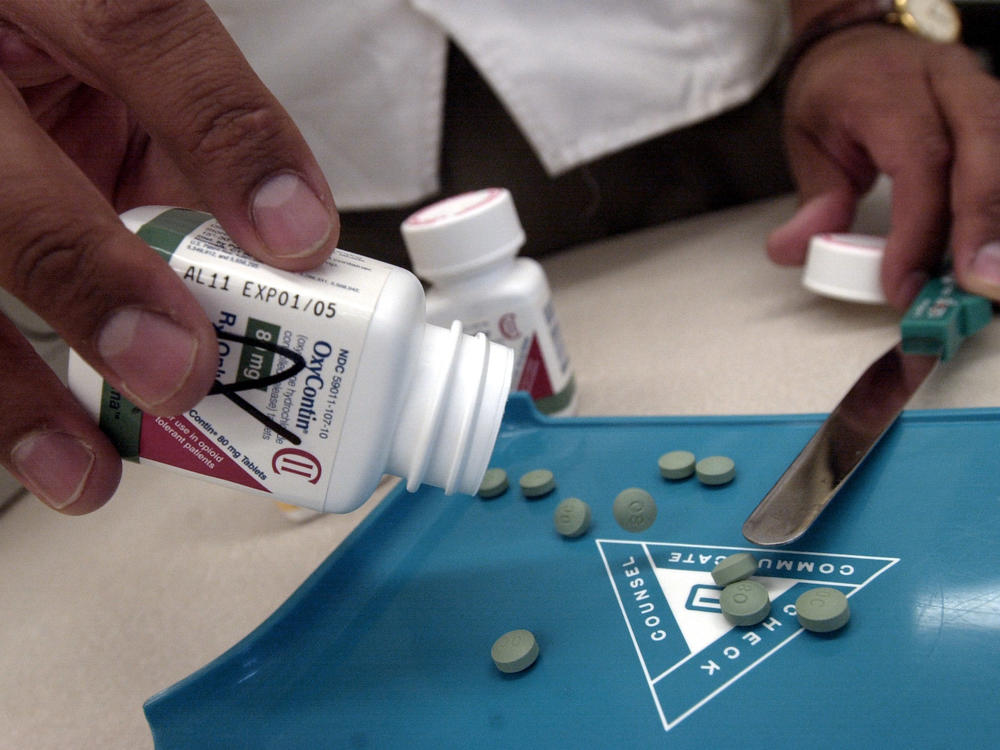Section Branding
Header Content
15 States Drop Opposition To Controversial Purdue Pharma OxyContin Bankruptcy
Primary Content
Updated July 8, 2021 at 7:57 AM ET
Fifteen states that led the effort to block a controversial bankruptcy plan for OxyContin-maker Purdue Pharma have abandoned the fight.
That's according to court documents filed by a mediator late Wednesday as part of a federal bankruptcy proceeding in White Plains, N.Y.
Among the states that have agreed to sign on to the bankruptcy deal are Massachusetts and New York, whose attorneys general had mounted fierce legal opposition to the agreement.
"The negotiations were difficult and hard-fought, with the outcome uncertain," said federal bankruptcy Judge Shelley C. Chapman in the legal filing.
Chapman was appointed in May to try to hash out a modified deal that the so-called non-consenting states could accept.
The settlement plan, which is now all but certain to be finalized next month, would shelter members of the Sackler family, who own Purdue Pharma, and many of their associates from future opioid lawsuits.
In return, the Sacklers have agreed to give up ownership of the bankrupt drug company. They will also pay out roughly $4.2 billion from their private fortunes in installments spread over the next decade.
According to the mediator's report, the Sacklers have now agreed to boost their settlement payment by a relatively modest amount — roughly $50 million.
The deal also includes a "material expansion" of the public document repository already created under the settlement plan that aims to provide some transparency about Purdue Pharma's role in the opioid epidemic.
Members of the Mortimer and Raymond Sackler branches of the family emailed a statement to NPR praising the decision by more states to accept the settlement.
"This resolution to the mediation is an important step toward providing substantial resources for people and communities in need," the statement said.
Public health experts say the introduction of OxyContin in the late 1990s helped usher in the nation's opioid epidemic, which has killed hundreds of thousands of Americans.
Purdue Pharma has pleaded guilty twice to federal criminal charges related to its opioid marketing practices, first in 2007 and again last year.
The Sacklers have never faced charges. Under this deal, they will admit no wrongdoing and will remain one of the wealthiest families in the U.S.
As recently as last month, 24 states and the District of Columbia opposed the deal. Now the number of states opposed to the settlement has dwindled to nine.
Speaking with NPR in May, Massachusetts Attorney General Maura Healey blasted the plan, describing it as a dangerous precedent. "The bankruptcy system should not be allowed to shield non-bankrupt billionaires," she said.
Healey also objected to a provision of the plan that will generate funds to pay Purdue Pharma's creditors in part through the future sale of opioids.
In a statement sent to NPR early Thursday morning, Healey said the modified deal brought significant accountability.
"While I know this resolution does not bring back loved ones or undo the evil of what the Sacklers did, forcing them to turn over their secrets by providing all the documents, forcing them to repay billions ... will help stop anything like this from ever happening again," Healey said.
Under this deal, Purdue Pharma has agreed to make public a vast trove of additional documents, including "evidence from lawsuits and investigations of Purdue over the past 20 years, including deposition transcripts, deposition videos, and 13 million documents," according to the Massachusetts attorney general's statement.
New York Attorney General Letitia James also issued a statement saying the settlement is "not perfect," but describing it as an important step for communities harmed by the opioid epidemic.
"We'll be able to more quickly invest these funds in prevention, education, and treatment programs, and put an end to the delays and legal maneuvering that could possibly continue for years and across multiple continents," James said in a statement emailed to NPR.
The other states now abandoning their opposition to the deal are: Colorado, Hawaii, Idaho, Illinois, Iowa, Maine, Minnesota, Nevada, New Jersey, North Carolina, Pennsylvania, Virginia and Wisconsin.
According to the mediator, nine states have yet to agree to the Purdue Pharma bankruptcy plan.
They include Connecticut, where the company is headquartered, as well as California, Delaware, Maryland, New Hampshire, Oregon, Rhode Island, Vermont and Washington.
The District of Columbia also hasn't agreed to the deal.
A confirmation hearing for the bankruptcy plan is scheduled for Aug. 9 in the court of federal Judge Robert D. Drain.
Copyright 2021 NPR. To see more, visit https://www.npr.org.

